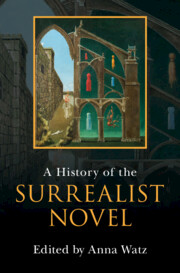Book contents
- A History of the Surrealist Novel
- A History of the Surrealist Novel
- Copyright page
- Dedication
- Contents
- Figures
- Contributors
- Acknowledgements
- Introduction
- I Marvellous Beginnings
- II Transgression and Excess
- Chapter 7 The Surrealist Novel and the Gothic
- Chapter 8 Surrealism’s Anti-Bildungsroman
- Chapter 9 The Mother Figure in the Surrealist Novel
- Chapter 10 British Surrealism at War
- Chapter 11 Surrealist Narratives of Trauma
- III Science, Alchemy, Nature
- IV Transnational Surrealism
- Index
Chapter 8 - Surrealism’s Anti-Bildungsroman
from II - Transgression and Excess
Published online by Cambridge University Press: 02 February 2023
- A History of the Surrealist Novel
- A History of the Surrealist Novel
- Copyright page
- Dedication
- Contents
- Figures
- Contributors
- Acknowledgements
- Introduction
- I Marvellous Beginnings
- II Transgression and Excess
- Chapter 7 The Surrealist Novel and the Gothic
- Chapter 8 Surrealism’s Anti-Bildungsroman
- Chapter 9 The Mother Figure in the Surrealist Novel
- Chapter 10 British Surrealism at War
- Chapter 11 Surrealist Narratives of Trauma
- III Science, Alchemy, Nature
- IV Transnational Surrealism
- Index
Summary
This essay traces the anti-Bildungsroman tradition under the influence of surrealism, in Georges Bataille’s Story of the Eye (1928) and Kathy Acker’s Great Expectations (1982). While Acker inherits Bataille’s fascination with violence and transgression, these themes are formally developed through the prism of punk and feminist conceptual art and performance. The recent resurgence of critical interest in Acker’s work prompts us to further consider her relationship to surrealism and the modernist avant-garde. While Acker’s homage to Bataille in the early novels signals a brazen ’theft’ of the male avant-garde tradition for feminist subversive ends, Great Expectations experiments with form and language in order to evacuate the Bildungsroman of its bourgeois (gendered) claims to moral authority and insight. While extreme experience in Bataille’s literary work holds out the promise of an affirmation of sorts, the excoriating emotional masochism of Acker’s characters tilts towards nihilism. And yet both Bataille and Acker draw on the Bildungsroman even as they decondition the humanist subject that lies at its very core, straining at the limits of language to represent the vertiginous intensity of affective life and the dissolution of desire into abjection.
Keywords
- Type
- Chapter
- Information
- A History of the Surrealist Novel , pp. 137 - 151Publisher: Cambridge University PressPrint publication year: 2023

